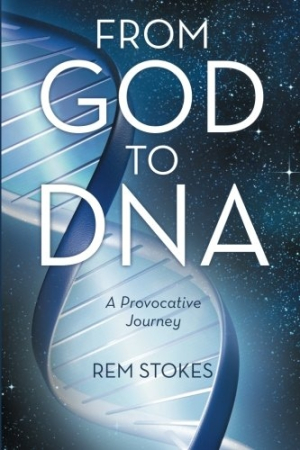From God to DNA
A Provocative Journey
Stokes makes strong arguments for a “bottom up” approach to truth based in natural law and scientific method.
Rem Stokes’s From God to DNA: A Provocative Journey provides strong arguments to support and validate the many formerly religious people worldwide who are casting aside the faith traditions of their youth for a free-thinking, experiential, science-based atheism. In this book, his third, Stokes gives new meaning to Jesus’s statement that “the Kingdom of God is within you,” explaining that our DNA holds all that makes us human: a genetically based moral code that is shared across cultures, races, genders, creeds, and political persuasions.
To counter the visions of hellfire and damnation that often arise as truth-seekers begin to question the teachings and traditions of organized religion, Stokes shares his own journey from belief through doubt, to the joy and confidence of true self-knowledge and freedom, making a clear case for his contention that the “god concept” does more harm than good. Comparing the results of belief in God—a supernatural “alpha male”—with those brought about by science, he convincingly demonstrates that religion has fostered unhealthy thinking and fear, put a damper on creativity and progress, and enforced its control of the masses through the state and the Inquisition (which, surprisingly, ended only in 1890 when the last European nation gave it up). Science, on the other hand, has made its contributions “without an ideology, without a creed, without conscription and without wars.”
To be fair, Stokes admits that religion has brought comfort to its adherents, but weighs this against the historical evidence that rather than seeking to enhance society as a whole, the church has mainly sought to solidify its own power, resources, and political influence. Moreover, the author finds little enticement to glean eternal and cosmic truth from sacred theology that was established by a political process.
Stokes makes good use of the current exciting research on brain plasticity to make cogent arguments in favor of an experiential, scientific approach to life. The brain, it turns out, actually suffers when it has to live in a static environment with closed options. “We live in an age of explosive new learning,” he writes. “Our understanding of almost everything is expanding exponentially. I do not think that living with a static theological creed serves us well. Therefore, I choose to remain open to the newness of life and to hold my beliefs tentatively, always willing to change with new, tested and confirmed information.”
Though his career was in science (he holds twenty-two patents), Stokes has also taught the history of Western civilization, and is to be commended for condensing a large amount of church and secular history into a narrative that, while concise, maintains a warmly conversational tone.
With its attractive cover, ample back cover copy that includes an author bio and photo, detailed table of contents and easy-on-the-eye layout and design, the overall package is appealing and informative. Thorough proofreading is suggested to correct errors in grammar, spelling, and word usage, and the book’s usefulness as a resource for independent research would be enhanced by the inclusion of a bibliography and an index.
Stokes’s “bottom up” approach to truth, based in natural law and scientific method rather than on religious teaching and tradition, honors spirituality as “the ability to be inspired” and avoids what he calls the “ultimate dishonesty”: lying to oneself.
Reviewed by
Kristine Morris
Disclosure: This article is not an endorsement, but a review. The publisher of this book provided free copies of the book and paid a small fee to have their book reviewed by a professional reviewer. Foreword Reviews and Clarion Reviews make no guarantee that the publisher will receive a positive review. Foreword Magazine, Inc. is disclosing this in accordance with the Federal Trade Commission’s 16 CFR, Part 255.

